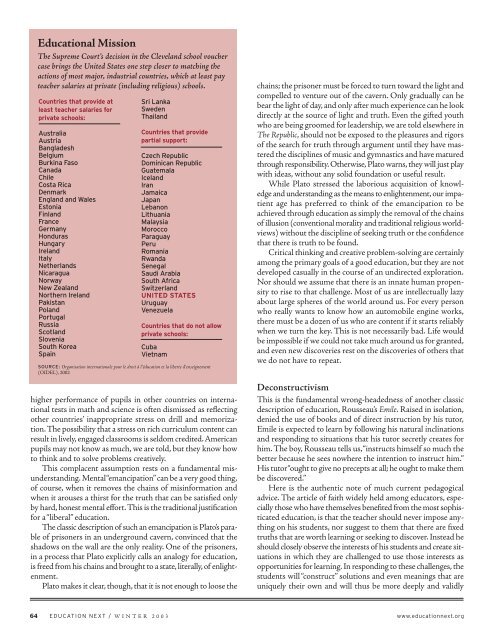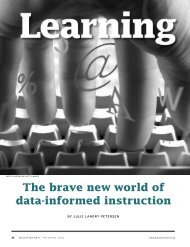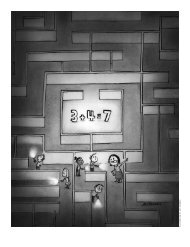featureCOMMON CULTURE GLENNgovernment . . . in proportion as it is efficient and successful, itestablishes a despotism over the mind, leading by natural tendencyto one over the body.The same point was made in a lapidary phrase by the U.S.Supreme Court in its 1925 Pierce v. Society of Sisters decision:“thechild is not the mere creature of the State.”But does this leave nothing to be said for the role of schoolsin fostering the qualities of civic virtue on which, all moralistsagree, the meaningful exercise of freedom depends? Put anotherway, does a commitment to limiting government’s role in theeducation realm also require that schools refrain from seekingto form the character and worldview of their pupils? This is oneof the central dilemmas of a republican form of government,at least in its contemporary form of limited state power. Whilerepublics pledge to respect the freedom of their citizens, theyalso depend on the voluntary adherence of those citizens to oftencomplex norms of civic life. As a result, as Montesquieu pointedout,“It is in republican government that the full power of educationis needed.” The citizens of a republic must be virtuoussince they govern themselves.Jean-Jacques Rousseau wrote that the teacher must choosewhether he will make a man or a citizen. The choice is not sostark, but it is nevertheless real.The state may seek to mold citizenson a particular pattern, but citizens in a free societysurely have a right not to be molded, in their opinions and character,by the state.The child is not the mere creature of the state.Emancipating the MindAny account of the tensions between the educational goals ofgovernment and of families must consider the third side of thetriangle: how teachers and other educators have understoodtheir mission. It is easy to assume that public school teachersline up on the side of the “state project”in education, while teachersin faith-based and other nonstate schools line up on the sideof parents. But the reality is much more complex. Indeed, thesimple state-versus-parents dichotomy fails to do justice tomany educators’ perception of themselves as emancipators ofthe minds of their students.As noted, education theorists have long contrasted theemancipatory role of the public school with the “indoctrination”they attribute to religious schools. This strikes a note withtremendous cultural resonance.“Emancipation,”Jacques Barzuntells us, is “the modern theme par excellence.” The most influentialof contemporary educators like to think of themselves asliberators of the minds of their pupils rather than as conveyorsof“dead”information, such as the traditions of Western culture.As a result, those who set the pace in the world of Americaneducation, and those who follow their lead, look down onthe teachers, parents, and policymakers who do not share thisunderstanding of the teacher’s mission. Leadership for Americaneducation has increasingly been provided by big-city andstate superintendents, professors of education, and officials ofthe education associations and teacher unions who see little needto respond to the uninformed views of the general public andof parents. This was illustrated by a 1997 Public Agenda surveyof “teachers of teachers,” professors in teacher-traininginstitutions. Of the 900 professors surveyed, 79 percent agreedthat “the general public has outmoded and mistaken beliefsabout what good teaching means.” They considered communicationwith parents important, but not in order to learnwhat education parents wanted for their children. Parentswere to be “educated or reeducated about how learning oughtto happen in today’s classroom.”The professors of education surveyed were convinced, forexample, that “the intellectual process of searching and strugglingto learn is far more important . . . than whether or not studentsultimately master a particular set of facts.” Sixty percentof them called for less memorization in classrooms, with oneprofessor in Boston insisting that it was “politically dangerous...when students have to memorize and spout back.”By contrast,according to another Public Agenda study, 86 percent ofthe public and 73 percent of teachers want students to memorizethe multiplication tables and to learn to do math byhand before using calculators.These are not purely technical questions; they reflectassumptions about the very nature of education. The professorsare expressing one form of the “cosmopolitan” values thathave been promoted by American schooling over the past century.This perspective has made the exclusion of religion fromthe public schools seem not a matter of political convenienceor respect for societal diversity, but essential to the mission ofeducation. It is also a sign of intellectual laziness. Teaching factsrequires knowledge, which is acquired through rigorous studyand research. All it takes to teach values is the ability to spoutyour own beliefs and prejudices.Platonic <strong>Education</strong>The marks of this condescension can be found in the variouscontroversies that swirl around public schooling. State-imposedcurriculum frameworks and standardized tests are condemnedas distractions from the teaching of “critical thinking.”Lecturingis rejected as an unsound practice because it wrongly assumesthat the teacher holds some authority. Nor should the teacherstress right and wrong solutions to the problems that sheposes; what is important is the pupil’s engagement with thesearch for an answer. This self-censorship on the part of teachersis even more important when it comes to sex education,where talk of “character” and “virtue” is deeply suspect.So much is this set of attitudes—the priority of“liberation”or “emancipation” as the central metaphor for the teacher’swork—taken for granted among American educators that thewww.educationnext.org WINTER 2003 / EDUCATION NEXT 63
<strong>Education</strong>al MissionThe Supreme Court’s decision in the Cleveland school vouchercase brings the United States one step closer to matching theactions of most major, industrial countries, which at least payteacher salaries at private (including religious) schools.Countries that provide atleast teacher salaries forprivate schools:AustraliaAustriaBangladeshBelgiumBurkina FasoCanadaChileCosta RicaDenmarkEngland and WalesEstoniaFinlandFranceGermanyHondurasHungaryIrelandItalyNetherlandsNicaraguaNorwayNew ZealandNorthern IrelandPakistanPolandPortugalRussiaScotlandSloveniaSouth KoreaSpainSri LankaSwedenThailandCountries that providepartial support:Czech RepublicDominican RepublicGuatemalaIcelandIranJamaicaJapanLebanonLithuaniaMalaysiaMoroccoParaguayPeruRomaniaRwandaSenegalSaudi ArabiaSouth AfricaSwitzerlandUNITED STATESUruguayVenezuelaCountries that do not allowprivate schools:CubaVietnamSOURCE: Organisation internationale pour le droit à l’éducation et la liberte d’enseignement(OIDEL), 2002higher performance of pupils in other countries on internationaltests in math and science is often dismissed as reflectingother countries’ inappropriate stress on drill and memorization.Thepossibility that a stress on rich curriculum content canresult in lively, engaged classrooms is seldom credited.Americanpupils may not know as much, we are told, but they know howto think and to solve problems creatively.This complacent assumption rests on a fundamental misunderstanding.Mental “emancipation”can be a very good thing,of course, when it removes the chains of misinformation andwhen it arouses a thirst for the truth that can be satisfied onlyby hard, honest mental effort.This is the traditional justificationfor a “liberal” education.The classic description of such an emancipation is Plato’s parableof prisoners in an underground cavern, convinced that theshadows on the wall are the only reality. One of the prisoners,in a process that Plato explicitly calls an analogy for education,is freed from his chains and brought to a state, literally, of enlightenment.Plato makes it clear, though, that it is not enough to loose thechains; the prisoner must be forced to turn toward the light andcompelled to venture out of the cavern. Only gradually can hebear the light of day, and only after much experience can he lookdirectly at the source of light and truth. Even the gifted youthwho are being groomed for leadership, we are told elsewhere inThe Republic,should not be exposed to the pleasures and rigorsof the search for truth through argument until they have masteredthe disciplines of music and gymnastics and have maturedthrough responsibility. Otherwise, Plato warns, they will just playwith ideas, without any solid foundation or useful result.While Plato stressed the laborious acquisition of knowledgeand understanding as the means to enlightenment, our impatientage has preferred to think of the emancipation to beachieved through education as simply the removal of the chainsof illusion (conventional morality and traditional religious worldviews)without the discipline of seeking truth or the confidencethat there is truth to be found.Critical thinking and creative problem-solving are certainlyamong the primary goals of a good education, but they are notdeveloped casually in the course of an undirected exploration.Nor should we assume that there is an innate human propensityto rise to that challenge. Most of us are intellectually lazyabout large spheres of the world around us. For every personwho really wants to know how an automobile engine works,there must be a dozen of us who are content if it starts reliablywhen we turn the key. This is not necessarily bad. Life wouldbe impossible if we could not take much around us for granted,and even new discoveries rest on the discoveries of others thatwe do not have to repeat.DeconstructivismThis is the fundamental wrong-headedness of another classicdescription of education, Rousseau’s Emile.Raised in isolation,denied the use of books and of direct instruction by his tutor,Emile is expected to learn by following his natural inclinationsand responding to situations that his tutor secretly creates forhim. The boy, Rousseau tells us,“instructs himself so much thebetter because he sees nowhere the intention to instruct him.”His tutor “ought to give no precepts at all; he ought to make thembe discovered.”Here is the authentic note of much current pedagogicaladvice. The article of faith widely held among educators, especiallythose who have themselves benefited from the most sophisticatededucation, is that the teacher should never impose anythingon his students, nor suggest to them that there are fixedtruths that are worth learning or seeking to discover. Instead heshould closely observe the interests of his students and create situationsin which they are challenged to use those interests asopportunities for learning. In responding to these challenges, thestudents will “construct” solutions and even meanings that areuniquely their own and will thus be more deeply and validly64 EDUCATION NEXT / WINTER 2003 www.educationnext.org









